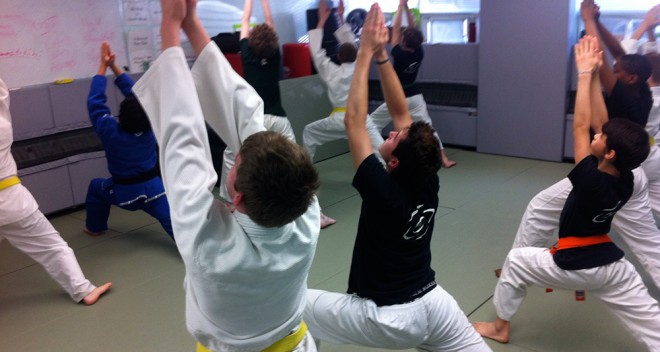Integra Mindfulness Martial Arts (R), commonly known as Integra MMA or MMA is a 20-week transdiagnostic group treatment for adolescents with learning disabilities (LD) and mental health problems (MH) developed by the Integra Program at the Child Development Institute.
Adolescents with a broad range of mental health disorders (e.g., ADHD, anxiety, depression, oppositional defiant disorder) and learning profiles are treated together, based on the assumption that to improve problem-solving skills and social and emotional well-being, youth need to become aware of their distress and remain present with it rather than engaging in behaviours that facilitate avoidance. combines mindfulness, cognitive therapy, and behavioural activation strategies to achieve this. A unique aspect of Integra MMA is that these therapeutic components are embedded in martial arts training. Martial arts plays two key roles. First, it promotes engagement in therapy for youth who would not normally engage or stay in treatment (Milligan, Badali, & Spiroiu, 2013). Since 2002, over 450 youth have participated in Integra MMA, with impressive treatment completion rates exceeding 95%. Second, martial art is an experiential vehicle that provides opportunities for youth to practice attentional control, self-monitoring, and staying present with challenging tasks rather than engaging in impulsive patterns of fight or flight when faced with stress.
We are interested in the attention, cognitive processing and mental health outcomes associated with this treatment and how best to support the implementation of this program in community settings, such as schools.
Our research on Integra MMA supports the following promising outcomes:
- reduced externalizing behaviour (e.g., aggression) in youth with ADHD+LD compared to a waitlist control (Haydicky, Weiner, Badali, Ducharme, & Milligan, 2012)
- decreased self-reported anxiety in youth with LD + anxiety compared to a waitlist control (Haydicky, Weiner, Badali, Ducharme, & Milligan, 2012)
- significant gains on EEG indices of attention compared to a waitlist control (Sibalis et al., in press; Milligan et al., submitted)
- Significant gains in secondary control and realistic thinking compared to a waitlist control (Milligan et al., 2017).
Funding: Scottish Rite Foundation
Videos about Integra’s MMA™ program:
Dr. Milligan presenting on Integra’s MMA™ program to the Scottish Rite Charitable Foundation.

